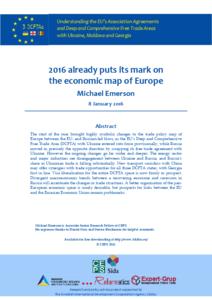
2016 already puts its mark on the economic map of Europe
The start of the year brought highly symbolic changes to the trade policy map of Europe between the EU- and Russian-led blocs, as the EU’s Deep and Comprehensive Free Trade Area (DCFTA) with Ukraine entered into force provisionally, while Russia moved in precisely the opposite direction by scrapping its free trade agreement with Ukraine. However the ongoing changes go far wider and deeper. The energy sector and major industries see disengagement between Ukraine and Russia, and Russia’s share in Ukrainian trade is falling substantially. New transport corridors with China may offer synergies with trade opportunities for all three DCFTA states, with Georgia first in line. Visa liberalisation for the entire DCFTA space is now firmly in prospect. Divergent macroeconomic trends between a recovering eurozone and recession in Russia will accentuate the changes in trade structures. A better organisation of the pan-European economic space is surely desirable, but prospects for links between the EU and the Eurasian Economic Union remain problematic.